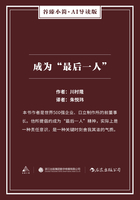"TWO began, in a low voice, 'Why, the fact is, you see, Miss, this here ought to have been a RED rose-tree, and we put a white one in by mistake.'"As I look round this room I feel sure Two, and Five, and Seven, have all been at work on it, and made no mistakes, for round the walls runs a frieze of squat standard rose-trees, red as red can be, and just like those that Alice saw in the Queen's garden.In between them are Chaucer's name-children, prim little daisies, peering wideawake from green grass.This same grass has a history which I have heard.In the original stencil for the frieze it was purely conventional like the rest, and met in spikey curves round each tree; the painter, however, who was doing the work, was a lover of the fields; and feeling that such grass was a travesty, he added on his own account dainty little tussocks, and softened the hard line into a tufted carpet, the grass growing irregularly, bent at will by the wind.
The result from the standpoint of conventional art is indeed disastrous; but my sympathy and gratitude are with the painter.Isee, as he saw, the far-reaching robe of living ineffable green, of whose brilliance the eye never has too much, and in whose weft no two threads are alike; and shrink as he did from the conventionalising of that windswept glory.
The sea has its crested waves of recognisable form; the river its eddy and swirl and separate vortices; but the grass! The wind bloweth where it listeth and the grass bows as the wind blows -"thou canst not tell whither it goeth." It takes no pattern, it obeys no recognised law; it is like a beautiful creature of a thousand wayward moods, and its voice is like nothing else in the wide world.It bids you rest and bury your tired face in the green coolness, and breathe of its breath and of the breath of the good earth from which man was taken and to which he will one day return.
Then, if you lend your ear and are silent minded, you may hear wondrous things of the deep places of the earth; of life in mineral and stone as well as in pulsing sap; of a green world as the stars saw it before man trod it under foot - of the emerald which has its place with the rest in the City of God.
"What if earth Be but the shadow of heaven, and things therein, Each to each other like, more than on earth to thought?"It is a natural part of civilisation's lust of re-arrangement that we should be so ready to conventionalise the beauty of this world into decorative patterns for our pilgrim tents.It is a phase, and will melt into other phases; but it tends to the increase of artificiality, and exists not only in art but in everything.It is no new thing for jaded sentiment to crave the spur of the unnatural, to prefer the clever imitation, to live in a Devachan where the surroundings appear that which we would have them to be;but it is an interesting record of the pulse of the present day that 'An Englishwoman's Love Letters' should have taken society by storm in the way it certainly has.
It is a delightful book to leave about, with its vellum binding, dainty ribbons, and the hallmark of a great publisher's name.But when we seek within we find love with its thousand voices and wayward moods, its shy graces and seemly reticences, love which has its throne and robe of state as well as the garment of the beggar maid, love which is before time was, which knew the world when the stars took up their courses, presented to us in gushing outpourings, the appropriate language of a woman's heart to the boor she delights to honour.
"It is woman who is the glory of man," says the author of 'The House of Wisdom and Love,' "REGINA MUNDI, greater, because so far the less; and man is her head, but only as he serves his queen."Set this sober aphorism against the school girl love-****** which kisses a man's feet and gaily refuses him the barren honour of having loved her first.
There is scant need for the apologia which precedes the letters; a few pages dispels the fear that we are prying into another's soul.
As for the authorship, there is a woman's influence, an artist's poorly concealed bias in the foreign letters; and for the rest a man's blunders - so much easier to see in another than to avoid oneself - writ large from cover to cover.King Cophetua, who sends "profoundly grateful remembrances," has most surely written the letters he would wish to receive.
"Mrs Meynell!" cries one reviewer, triumphantly.Nay, the saints be good to us, what has Mrs Meynell in common with the "Englishwoman's" language, style, or most unconvincing passion?















